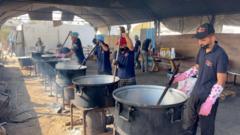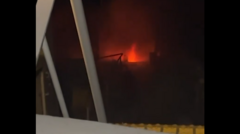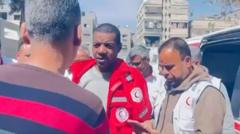Over 600,000 Gazans are reliant on dwindling food supplies from community kitchens like Anera, as the Israeli blockade leaves them with little to no resources. Humanitarian efforts are now under severe strain, with increasing calls for the blockade to be lifted amid fears of mass starvation.
Crisis Deepens in Gaza: Community Kitchens Face Food Shortage Amid Ongoing Blockade

Crisis Deepens in Gaza: Community Kitchens Face Food Shortage Amid Ongoing Blockade
With food stocks running perilously low, community kitchens in Gaza warn of imminent hunger as the Israeli blockade intensifies.
With little access to nutritious meals, families in Gaza are increasingly dependent on the efforts of community kitchens, yet a dire food shortage looms after two months of an intensified Israeli blockade. In Khan Younis, Anera's kitchen produces around 6,000 meals daily, but the resources are dwindling amid restrictive conditions that have hindered humanitarian aid.
Sami Matar, head of the Anera team, described how the blockade has severely impacted food availability, transforming once protein-rich meals into simple dishes like koshari — a mixture of lentils and rice served with tomato sauce. Scarcity in supplies has meant no fresh produce or meat has been available to families relying on these kitchens for sustenance.
Israel's closure of all crossings into Gaza, combined with military actions, has left the population of over 2.1 million under severe strain. The ongoing situation has prompted warnings from humanitarian organizations, including the UN, that deliberately starving civilians is a war crime. The UN’s humanitarian chief, Tom Fletcher, argued that aid should not serve as a tool in political negotiations, emphasizing that blocking such essential support undermines both dignity and hope.
As funding and food supplies run low, Anera is forced to ration decreasing stocks, fearing the critical wells of support will run dry shortly. The team reported they have only two weeks of supplies left, down from a pre-blockade shipment of over 100 trucks per week filled with essential items.
Despite accusations from Israel that Hamas diverts humanitarian aid, organizations like Anera maintain strict protocols to ensure transparency and compliance. Each meal distributed is critically needed, as exemplified by the stories of families, like that of a displaced mother who reported having no means to cook for her children.
The humanitarian crisis in Gaza is exacerbated by ongoing violence and displacement since the onset of hostilities over a year and a half ago, resulting in more than half of the population being uprooted. The current situation has been labeled one of the worst periods for Gazans, with international pressure mounting for Israel to lift the blockade and allow for more comprehensive aid distribution.
Calls for change are growing louder, not just from within Gaza, but from international leaders who express concern for the humanitarian implications of such a blockade. As Matar and his team navigate through the pressing challenge of food distribution, the future of thousands hangs precariously in the balance, with no solution in sight, signaling an urgent appeal for immediate action on the humanitarian front.
Sami Matar, head of the Anera team, described how the blockade has severely impacted food availability, transforming once protein-rich meals into simple dishes like koshari — a mixture of lentils and rice served with tomato sauce. Scarcity in supplies has meant no fresh produce or meat has been available to families relying on these kitchens for sustenance.
Israel's closure of all crossings into Gaza, combined with military actions, has left the population of over 2.1 million under severe strain. The ongoing situation has prompted warnings from humanitarian organizations, including the UN, that deliberately starving civilians is a war crime. The UN’s humanitarian chief, Tom Fletcher, argued that aid should not serve as a tool in political negotiations, emphasizing that blocking such essential support undermines both dignity and hope.
As funding and food supplies run low, Anera is forced to ration decreasing stocks, fearing the critical wells of support will run dry shortly. The team reported they have only two weeks of supplies left, down from a pre-blockade shipment of over 100 trucks per week filled with essential items.
Despite accusations from Israel that Hamas diverts humanitarian aid, organizations like Anera maintain strict protocols to ensure transparency and compliance. Each meal distributed is critically needed, as exemplified by the stories of families, like that of a displaced mother who reported having no means to cook for her children.
The humanitarian crisis in Gaza is exacerbated by ongoing violence and displacement since the onset of hostilities over a year and a half ago, resulting in more than half of the population being uprooted. The current situation has been labeled one of the worst periods for Gazans, with international pressure mounting for Israel to lift the blockade and allow for more comprehensive aid distribution.
Calls for change are growing louder, not just from within Gaza, but from international leaders who express concern for the humanitarian implications of such a blockade. As Matar and his team navigate through the pressing challenge of food distribution, the future of thousands hangs precariously in the balance, with no solution in sight, signaling an urgent appeal for immediate action on the humanitarian front.

















